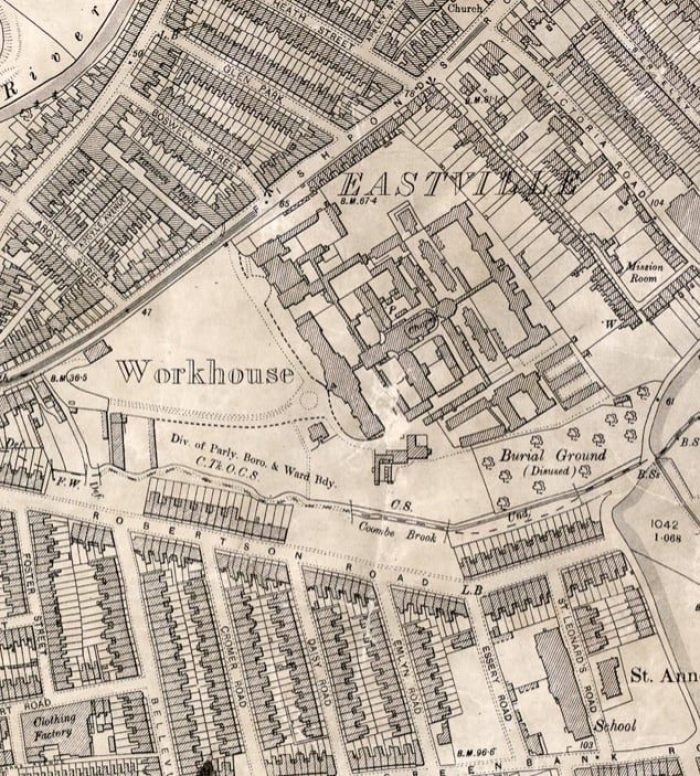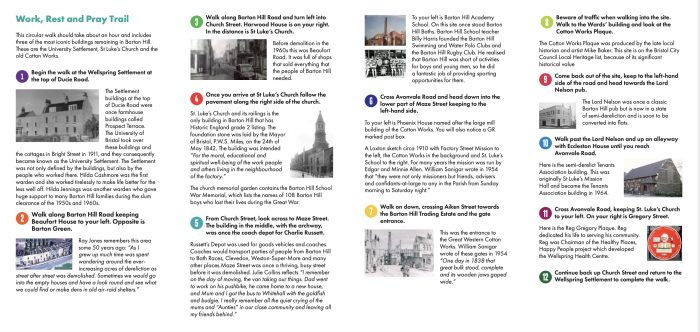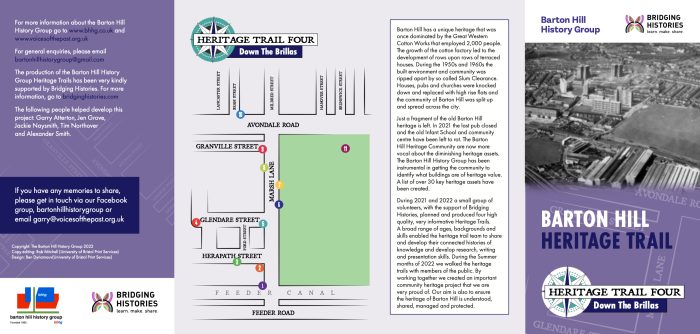Garry and Alex celebrating 40 years of Barton Hill History Group
This is Barton Hill History Groups' 40 year anniversary. We formed in 1983, many many thousands of years ago it seems. We're all about enjoying ourselves and enjoying our past, and making sure the future is a good place to be as well.

We’d like to hear some stories about Barton Hill, so take us on a journey!
Garry: Alex and myself could spend all day talking about funny stories, sad stories, amazing stories. Sometimes we have a History Group session which I think would be really good for children to do. We bring along sometime to share. It could be a picture of your granddad. It could a letter. Sometimes it could just be people telling stories of funny things that happened in their lives. Getting locked out of their house, swimming, going to church.

We do laugh a lot as we share our life stories together.
We run a Memory Café, and there is so much we could talk about. We meet once a month on a Tuesday morning in the Wellspring Settlement and invite people along to tell their stories. We put together a photo display of 12 pictures that tell the story of the area. They include memories of school days, people playing, socializing across the years. It is very pleasant and informal, and we enjoy sharing our present and past stories with each other. We have singing, listening to music, we watch films, and write things down, and it is very much up to people how they want to share their stories of the past.
In fact, I’d like to tell you a little story which is about how we should be inspired by older people. Last summer we went for a walk, and a 90 year old man from Barton Hill came on the walk, and he was telling us stories about his grandad, who served as a soldier in the First World War. Alex said “We’ve got a great big plaque that’s got about 200 names of people who sadly lost their lives in the great War, who worked for a local company in the area. I wonder if your granddad’s name is on the plaque?” We took him to the church, and he looked down and saw his granddad’s name right there on the plaque. It was wonderful. Bridging Histories.

Alex: It was really great to be able to connect someone with their own family history that they were completely unaware of. There was actually three plaques and they were heavy as anything, but to be able to share them and see somebody find their own relative made it worth all the heavy lifting.
Alex you’ve got a really neat project on the horizon, sponsored by Bridging Histories. Can you tell us about it?
Alex: For sure! The project is called “Our Street History”. We’ll be starting with Holmes Street. We’ll hand a letter out to each household on the street and invite them to explore who was living there since the house was built in late 1800s. Or they can also share with us the history of their family and their family’s place in the area. In Barton Hill there’s been quite a change in the area in the population. In the 1990s – early 2000s with the civil war in Somalia, a lot of families came across from Somalia. And that’s actually a shared history with the First World War, we found a lot of refugees from Belgium coming across to Barton Hill. And that all fits into the still-going history of the area.
We’ve got a community history day going on in March, we’ll give them the resources. And then we’ll put on an event in the summer where they can make a faux blue plaque to a resident of the house or a family member and display it.
I love that its such a simple plan, and people could do that all over Bristol. It could be a whole movement that you’re starting.
Alex, how did you get into local history as a young person?
Alex: I’ve always had a general interest in history, but not local history. That changed during Covid lockdown, with being stuck in the house. On Facebook I saw Barton Hill History Group and started exploring the history of the buildings in the area, like the old school, and then about the history of my street and how my family fits into it all. And it just snowballed there, and I got involved in community heritage campaigns. Every day I seem to be finding out more about the history of the area and my family’s place in it. My family’s history in comparison with other families in the area isn’t such a long one – my parents moved to Barton Hill back in 1977. But between 1977 and 2023, there’s been a lot of changes and I’ve seen a lot of changes first-hand. So by looking back we can say, oh that building’s no longer there, or that building is now something else. I remember what was there before, because I used to go there – my primary school used to be there, or there used to be swimming baths. When you listen to shared stories from other people you try to visualize what that would have looked like, and now you realize “oh I’m telling my own stories myself, now”

Barton Hill School, Queen Ann Road. Photo by Roger Templeman
Garry: A great link between Alex and myself is that my grandparents and great grandparents lived opposite his house 100 years ago. So he would have played in the street a hundred years ago that Alex played in as a child.
Can you give us an insight into Barton Hill as an area?
Garry: Well the clue is in the name – it is a hill. It is very difficult to get in and out of. There’s an area to the south which is a canal and that’s difficult to cross. Other side is a railway line, which is difficult to cross, and other side is a main road. like a hill where people
So people would come and live there and stay their whole lives and stay in the area a lot.
Garry: Yes, that’s shaped the place – the physical structure of roads, railways, fields. So communities have stayed together a long time. You tended to work in a factory and walk to work. You’d go to the local school and local shops. You’d meet friends and relatives who lived in the same street as you. You might marry somebody who lived next door. So communities evolved and stayed on Barton Hill and a fantastic place evolved.

To follow up on the idea of new communities, we’ve now got a second generation Somali community. So I met a guy from Somalia who brought his children along. He said to the children “Listen to this man. This is your history.” It captures the idea that it is a community growing in an area.
Bristol as a city is always changing. And during the 1950s, 60s and 70s there were lots of changes. And in the 50s and 60s, changes happened without people being involved. So somebody would say “I’ve got a great idea. I’m going to put a big road right through the city.” And then later people said “That’s not fine, I don’t want a big road.” So people realized we need to stop and think and talk to local people. So in East Bristol, parts of the big road were built, and in Totterdown lots and lots of houses were cleared. It was going to go right through Barton Hill, but people said no. And also money ran out.
That’s interesting because in St Pauls some people said no too, but it wasn’t enough to stop the M32 coming through. Well done Barton Hill. Okay, let's close with some poetry. Alex you wrote an I am From poem, can you share it?
When I first became aware of Bridging Histories the first activity that caught my eye was about creating a poem of your neighbourhood. So I tried to capture the changes, all the terraced houses, the streets being built, to the way it is today.

Listen to Alex reading his poem here:
Barton Hill Heritage Trails
In 2022, Barton Hill History Group created a series of Heritage Trails for the area, sponsored by Bridging Histories. We were delighted to be involved. You can download, print the maps out and explore what Barton Hill History has to offer!
Download Heritage Trail 1 here: "Work, rest & pray"


Download Heritage Trail 4 here: Down the Brillas

